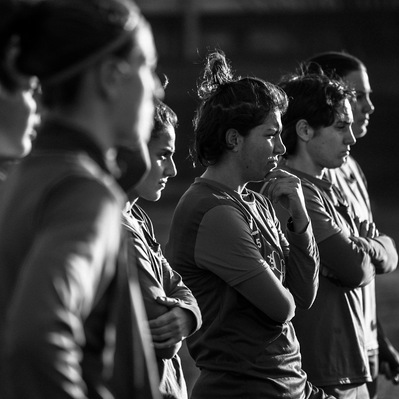Calcio Rinascimento. Written and photographed in January 2017 in Florence, Italy.
Florence was the first city in Italy to pave its roads. Its dialect is known to be the root of the modern day Italian language. The birthplace of the Renaissance, nurturing the talents of Donatello, Leonardo Da Vinci, and Michelangelo. Without its support, we wouldn’t have our “father of science,” Galileo Galilei. Florence has long marched to the beat of its own drum.
When it comes to Italian football, you might immediately think of Gli Azzurri - the men’s national team - or Serie A sides like Juventus, AC Milan or Internazionale. While ACF Fiorentina is a historical Italian club, it’s not the men that currently have Florence in the spotlight. Fiorentina Women’s FC, the only professionally affiliated women’s club in Italy, have their eyes on what should be - a level playing field for men and women - and are looking for others to follow.
“In Italy, there is football, and there is everything else,” says Sandro Mencucci, the club’s President. That is, unless you’re female. Then maybe you do ballet, ride horses, or play tennis. In Italy, roughly 20,000 females play football. Compare that to Germany, where an estimated 1M play. Too long has the sport been looked at as a man’s game in Italy, and that isn’t something that sat well with the Della Valle family, who’ve owned ACF Fiorentina since 2002. With approval from the Italian Football Federation, they acquired the sporting title of the local women’s club ACF Firenze in July of 2015 and immediately set to work to bring professional women’s football in Italy into the 21st century by establishing Fiorentina Women’s FC.
Sandro Mencucci has been with ACF Fiorentina since 2002, and without a doubt knows a few things about operating a top flight club. As Chief Executive Officer - a position he also still holds - he helped quickly bring the club back to the Serie A, from the 4th division, after the previous owners had taken the club into bankruptcy. Similarly, with Fiorentina’s Women’s FC, he took what was essentially a nonprofit organization, struggling to stay afloat - let alone in the first division - to a third place finish in the 2015-2016 Serie A season. Currently, they are 15-0-0 and 6 points clear at the top of the table. In only two seasons, they are on the path to winning the league and qualifying for the Champion’s League. Underneath a big smile he said, “We have to win. If we don’t win, then this is only talk talk.”
But the truth is, this isn’t a business move for ACF Fiorentina. This is bigger than the sport of football. “Our philosophy is to treat the women players the same as the men. Running both clubs exactly the same. We have two coaches, a medical staff, a training staff. This isn’t common in Italy,” Sandro tells me, as we stand pitch side watching the club train on a Friday afternoon. “Football is a sport for all, it has no gender,” he goes on to say. “You have to fill the gap. And there is a big gap between men and women. But it can be smaller. Women have to have the same opportunities in their jobs, their professions, in all ways of their lives. This is about gender equality.”
With the players now able to focus solely on their performance on the pitch, the club’s rapid success shouldn’t at all come as a surprise. “The change (from ACF Firenze to Fiorentina Women’s FC) has given us many benefits, from the tiniest details to the most pivotal ones. From the equipment to the locker rooms, everything has improved and developed. I am satisfied, not only for being part of this new deal but also for women’s soccer as a whole. I hope Fiorentina will be a model for the rest of Italy,” said Giulia Orlandi, midfielder and the club’s captain. Echoing that sentiment is the right back Alia Guagni. “We’re extremely glad, as this is a step we had been waiting for, and now we’re living it daily. Fiorentina is the first team and I’m sure it’s something good for every team to also sort out.” And that’s exactly what Sandro and the Della Valle family have in mind.
“I have a recipe, if you will, for women’s football to reach a higher position in Italy,” said Sandro. “In my eyes, our federation could decide that, say in 3 years, you have to establish a women’s team if you’d like to play in the Serie A, where the big money is. Just like there are a lot of specific rules to oblige to, from the stands, the training grounds, to the medical sector. In Italy, especially, you need push for something like this.”
Looking beyond the professional game, there are already noticeable culture shifts taking place in Italy. According to Swedish goalkeeper Stéphanie Öhrström, who has been playing in Italy now for 6 years, “families are changing their minds. When little girls ask to come to the pitch and play, their parents now have a different attitude and bring them to our training grounds in San Marcellino. Also, due to TV, newspapers, and social media, we’re opening minds and sharing positive values. The way women can change the world passes through sporting equality. This is the first step of a long path, but we made it.”
And the numbers are there to prove it. “We had opened the registration to the youngest girls in the city, the U-12s, and we had to close it because there were so many families interested in our project,” Sandro recalled. “In the past, women’s clubs were not managed professionally. Now, people trust in us and are happy to send their baby girls to our club to train, to play football.” Attendance has also increased dramatically. 2 years ago, the club averaged about 30 people per match. Now, they see over 500 people, with even a select loyal few traveling to away matches.
Only in its second year, the success of Fiorentina Women’s FC is undeniable - both on and off the pitch - but the journey has only begun, and there is a very long road ahead. “Speaking of the budgets of the teams, there is no comparison between the men and the women. Totally different, two different worlds,” Sandro said, painting an honest picture of the current state of the sport. But he sees a different reality not too far off. “We have to do what the Serie A did in the 80s. To push football in Italy, we brought in important players from abroad, from where football was most important,” he recalled. Speaking on Olympique Lyonnais, who he sees as the most important women’s club in Europe, and their recent acquisition of American star Alex Morgan on a 6 month loan, “In the United States, women’s football is very popular. We need to bring in some important Americans to play here, to help push this project.” “Right now we could not afford her,” he amusingly said, “but considering that Florence is the most beautiful city in the world, if a good American player could consider not only the money, there is an opportunity here in Florence.”
In 1339, Florence literally paved the path for the rest of Italy to follow. But it is now 2017, and Italy’s need for a cultural resurfacing is evident as you walk the worn cobblestone streets today. Fiorentina Women’s FC is doing a labor of love by paving new roads in Italy, and only hopes that the rest of the country makes the right turn and follows their lead.































